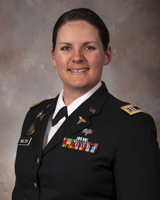Let’s Celebrate the Military Pediatricians who are Matched every December

Noelle Molter, MD, MBA, CPT, MC, USA
December 7, 2022
“Refresh, refresh, refresh” I thought to myself as I anxiously awaited my match results. I was watching photos of me and my classmates roll across the computer screen. COVID-19 greatly affected our match day, but we could at least all get together virtually. Finally, the clock flipped to noon and congratulations messages started flooding the comment boxes. I checked my email and refreshed again – and there it was, my match results. My husband looked at me earnestly, “What does it say?!”
I grinned. “I got it!”
For many, this is a familiar story with one big difference - in the military, our match day takes place in December, months prior to the national match. Interviews, audition rotations, and applications are high priority during the start of fourth year. Although we are located across the country, most within civilian medical schools, every incoming intern deserves to be fully celebrated on match day.
Each year, there are an average of 800 medical students on a Health Professions Scholarship who will be entering a military residency. Additionally, there are approximately 170 students who graduate from the Uniformed Services University School of Medicine each year. Of those, roughly 8-12% become pediatricians.
I know what you might be thinking - the military has pediatricians?
Yes!
Pediatricians are a vital part of military service. Created in 1959, the American Academy of Pediatrics Section on Uniformed Services started with 25 members and today exceeds 800 members. There are seven residency programs, with over 70 new interns each year. Besides general pediatric knowledge, we are extensively trained in newborn management and critical care in preparation for serving both in austere environments and rural communities. As new attendings, we are often among the only pediatricians at a military base, caring for service members in remote stations both stateside and overseas.
You may not realize it, but you almost certainly know a pediatrician who was military-trained. Our immediate past president, Dr. Lee Beers, completed her residency at Naval Medical Center Portsmouth, and her first assignment post-residency was as the sole pediatrician at Guantanamo Bay, Cuba. Col. Ogden Bruton, MD, who discovered X-linked agammaglobulinemia (also known as Bruton agammaglobulinemia), served as an Army pediatrician for 21 years. He also developed the first Army pediatric residency program at Walter Reed Army Medical Center in 1949. RSV Immunoglobulin was developed by Col. Val Hemming, MD, U.S. Air Force retired, and the Department of Pediatrics at the Uniformed Services University. Palivizumab continues to be used worldwide to help prevent RSV infection.
Even as trainees, our experiences are unique, diverse, and challenging. Many pediatric residents participated in Operation Allies Refuge/Welcome, providing medical care and assistance to Afghan travelers overseas and as they resettled in the United States. Residents and fellows at Walter Reed National Military Medical Center shared their collective experiences and how it changed their perspectives as budding pediatricians. Other humanitarian efforts --such as the Pacific Partnership with the USNS Mercy, a hospital ship commissioned in 1986, highlight the importance of community building and resource utilization in partnered countries. As a fresh second-year resident, I spent three weeks in the Philippines as the only pediatric resident aboard. I was humbled by the responsibility and excited by the challenge to grow as a physician. My most memorable experience was when an Australian general practitioner found me in a crowded room during a Barangay Health Fair to ask if I was the pediatrician.
“I’m a pediatric resident,” I said, hesitantly.
“Perfect, come with me.”
He took me to an infant with a large abscess on his sternum, and as he motioned to the family that I was the pediatrician, the infant was shoved into my arms with a familiar look that simply said, “Fix him.”
“Despite my rapidly beating heart, I felt the comfort of my intern training and military pediatric mentors guiding me. I felt the fear, ubiquitous as trainees, but also a driving force in military training: How can I adapt?”
Despite my rapidly beating heart, I felt the comfort of my intern training and military pediatric mentors guiding me. I felt the fear, ubiquitous as trainees, but also a driving force in military training: How can I adapt? As the staff pediatrician rounded the corner, I realized how in demand our skills are both at home and while serving on deployments around the world. As one neonatal fellow reflected on providing medical care during Operation Allies Refuge/Welcome, “I appreciated the unique training that military pediatricians receive; we are taught to care for complex pediatric patients, wherever they might need our help.”
This year, military match day is Dec. 14, and hopeful soon-to-be pediatric interns and fellows await their results. They will be writing their stories as military trainees and I am eager to hear about them. We are excited to welcome them into not only the military pediatric family, but the larger pediatric community as well. Please take time to congratulate our newest interns and fellows!
For more information and resources:
Disclaimer: The views expressed in this article are those of the author and do not necessarily reflect the official policy of the Department of Defense of the U.S. Government.
*The views expressed in this article are those of the author, and not necessarily those of the American Academy of Pediatrics.
About the Author
Noelle Molter, MD, MBA, CPT, MC, USA
Noelle Molter, MD, MBA, CPT, MC, USA, is a pediatric resident at the National Capital Consortium/Walter Reed National Military Medical Center as well as a Captain in the US Army. She currently serves as the AAP Section on Pediatric Trainees liaison to the Section on Uniformed Services.